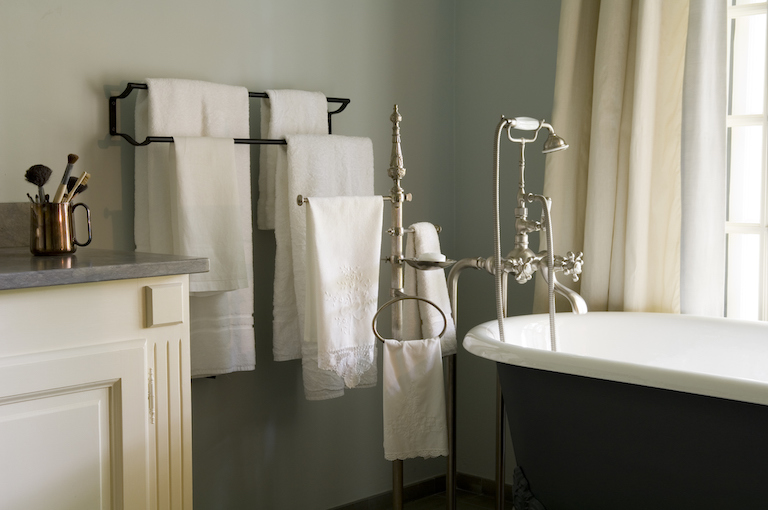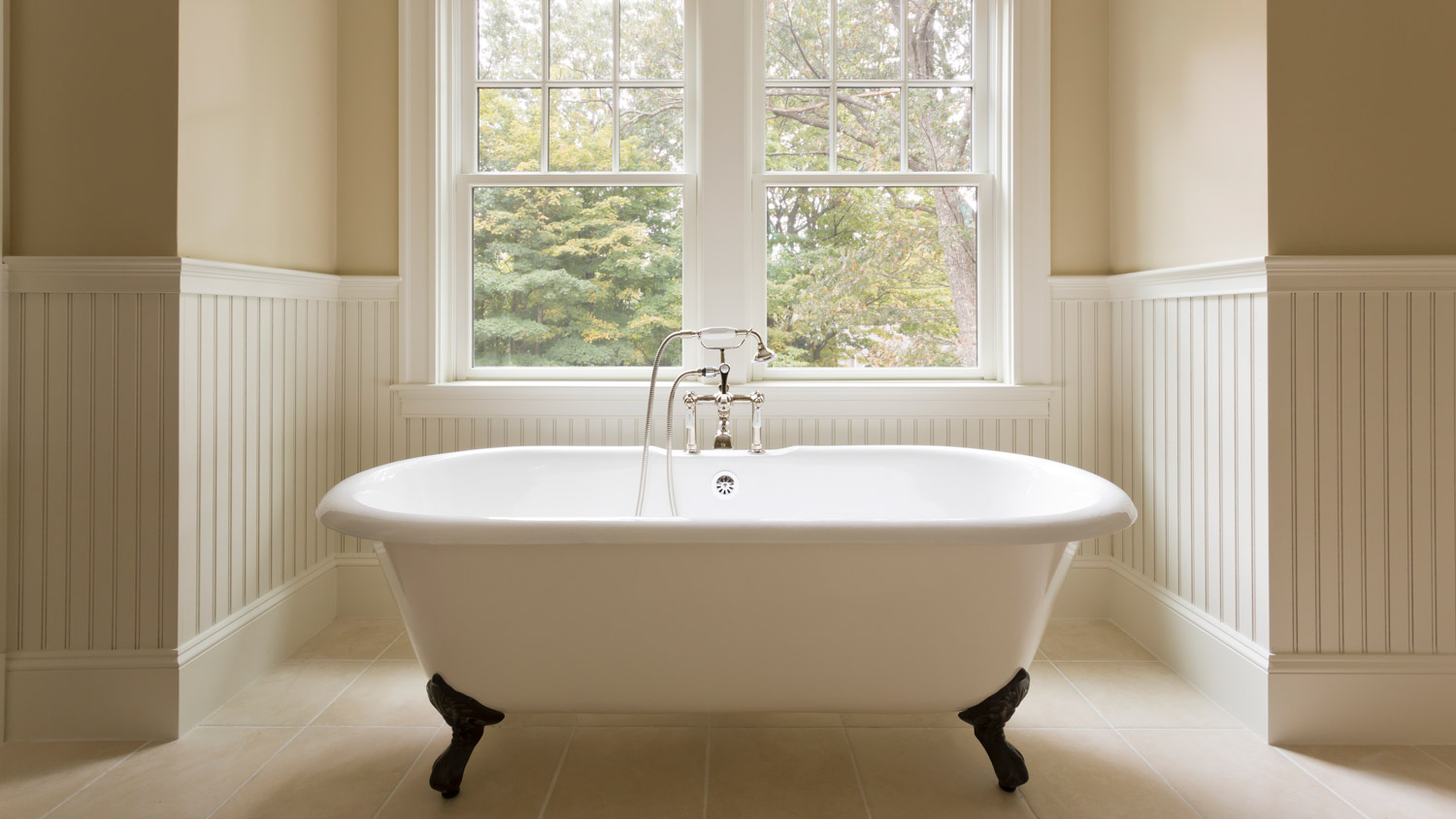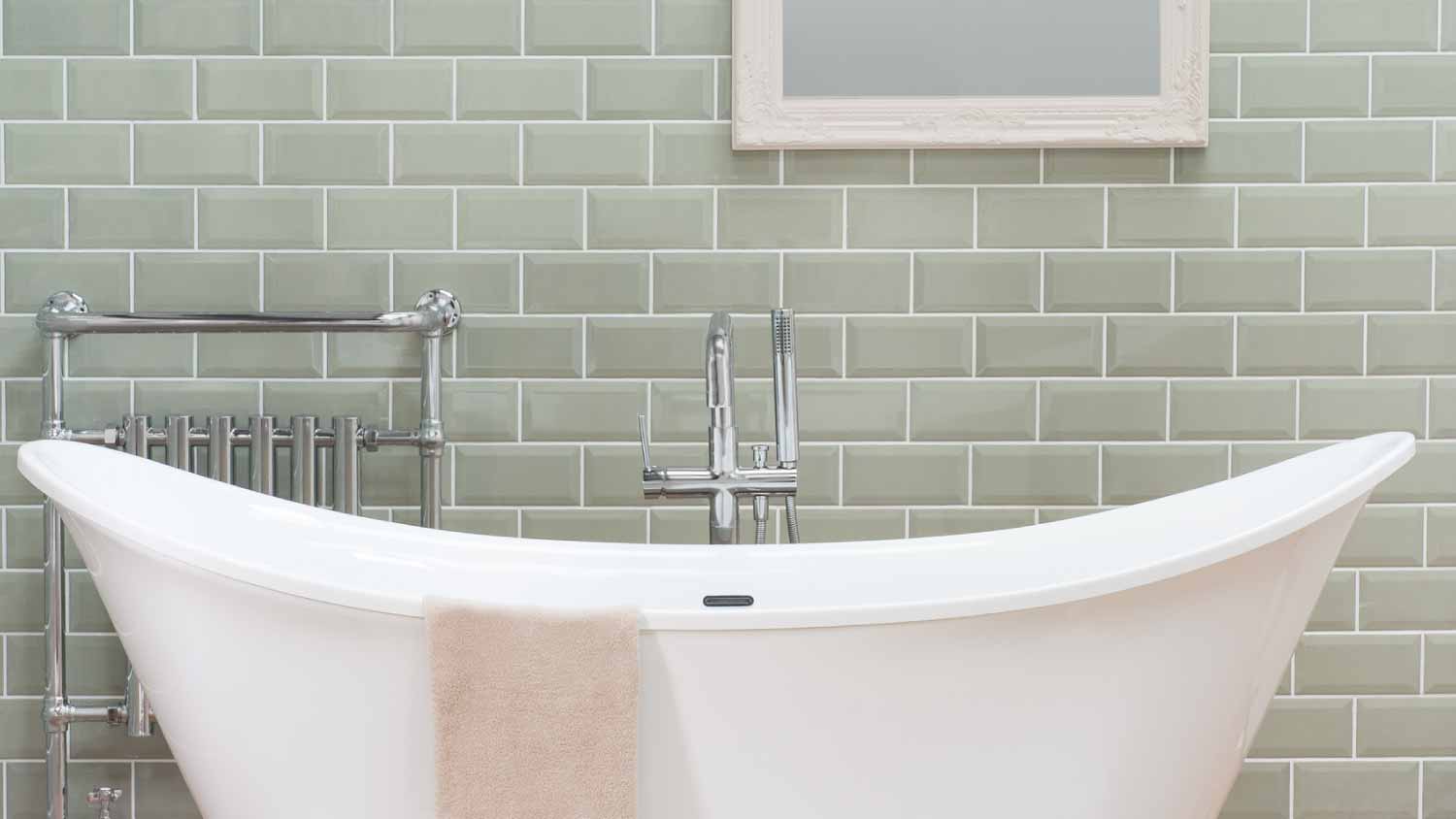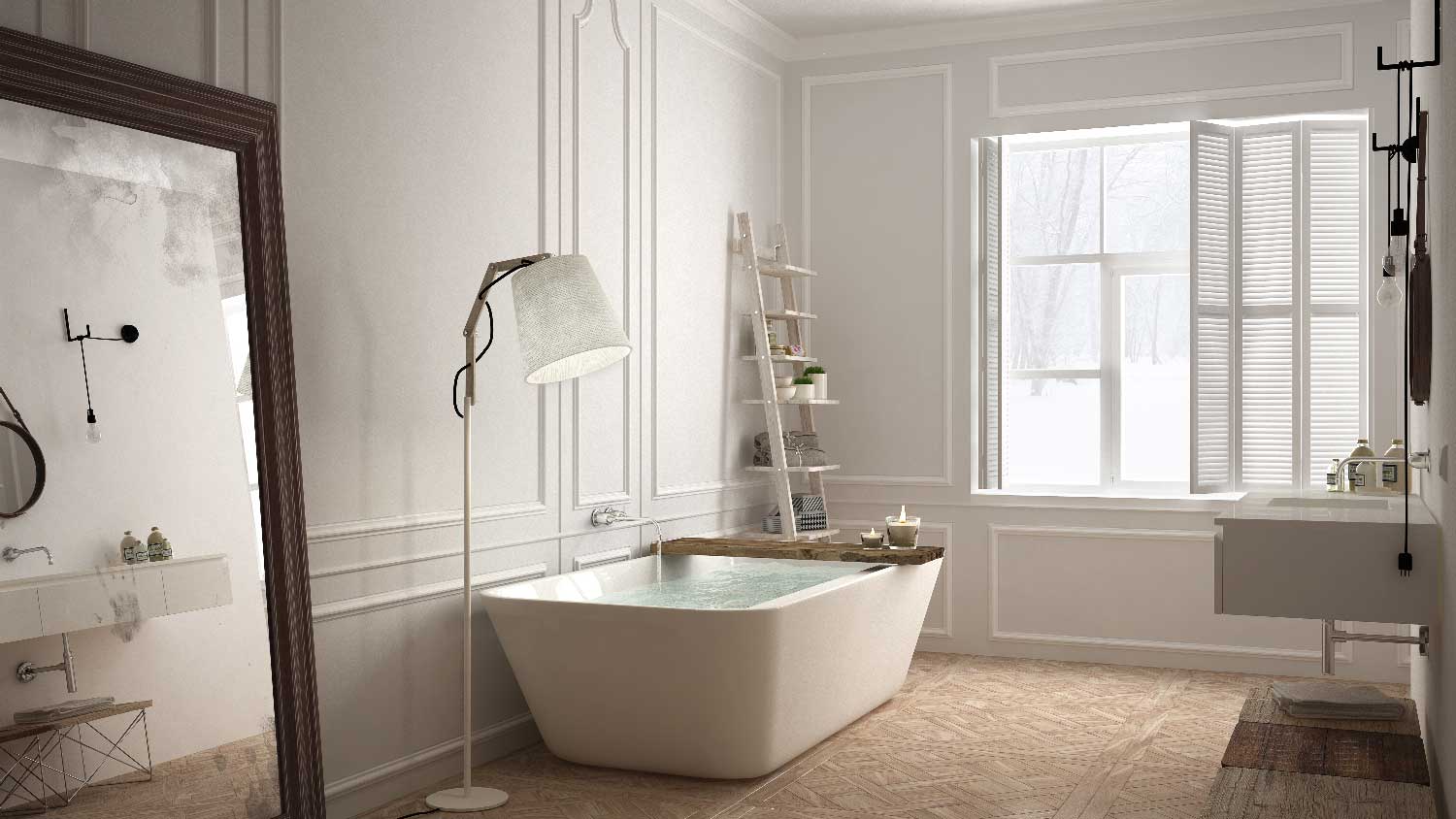
Backsplash installation costs vary by tile type, design, kitchen layout, and contractor. Find out how much your dream backsplash will cost you.
Before ripping out old tile, prepare to spend at least two months on your remodel


Bathroom remodels occur in three phases: pre-construction, construction, and post-construction.
These phases cover planning, execution, and your final walkthrough.
Factors like the bathroom condition and project scope affect the timeline.
You can expedite the process by making sure the space is clean and the plan is clear.
Bathrooms come in all shapes and sizes, but even the smallest powder rooms can feel luxurious with a fresh renovation that incorporates modern bathroom ideas. While there’s no telling what you might find while ripping out old tile, a little planning is all you need to confidently DIY your bathroom repair.
Remodeling a bathroom typically takes between two and three months. Below, we break down the common stages of bathroom renovations so you can be well-prepared to tackle the project with ease.
Upgrading your powder room or primary bathroom can be as in-depth as you want to make it. But no matter what, every bathroom remodeling project involves the same three phases.
The pre-construction phase usually takes at least three to four weeks, assuming you already own the property you plan on renovating. If not, add on the time it will take you to close on a house (usually at least a month).
In the pre-construction phase, the homeowner’s job is to dream up bathroom plans and hire the right contractors to execute the vision. Find bathroom remodelers near you who have the appropriate state licenses and knowledge to safely work with tile, plumbing, and electricity. The right pro can make sure everything is handled, helping you avoid water damage or broken pipes.
“With bathroom remodels, we can often save the client money if they can creatively use the same footprint or layout of water supply and drainage,” says Bob Tschudi, Angi Expert Review Board member and a Raleigh, NC-based general contractor. “Moving supply lines is expensive, and moving drainage lines is twice as expensive.”
Once you find a few promising contractors with the right expertise, schedule site visits to walk them through your current bathroom. Share the space’s measurements with them, explain what kind of materials you want to use, and show them drawings and photos of bathroom remodeling ideas you’re inspired by. It’s also a great opportunity to ask questions before the bathroom remodeling process gets started.
Contractors will then send you written bids for the project, including its estimated cost, within a week or less. Spend a few days reading over the bids and choose the contractor you like best. Review and sign the contract, make your first upfront payment to the contractor, and decide on your upcoming construction schedule.
Next, obtain any necessary permits from your city and state. This step can bring a few delays depending on how complex your project is. Fortunately, most contractors are familiar with the permitting processes and can likely walk you through it. Give yourself at least a week or two to complete this step of the pre-construction phase.
Finally, you’re ready to buy materials and give your neighbors a heads-up that you’ll be doing construction out of courtesy. Look for materials online, at local retailers, and anywhere your contractor recommends.
Once again, the construction phase will vary widely in time and remodeling costs for everyone, once again due to how in-depth your reno is. Give yourself at least one week to demo the old bathroom. Before installing new flooring, tiling, faucets, or light fixtures, you should strip and dispose of the existing materials.
If your project requires city permits, allow one week for an inspector to evaluate electrical rewiring and new plumbing installations. Also, prepare for any possible waiting lists. You typically cannot move forward with the final aspects of your renovation until a master plumber, electrician, or inspector examines and signs off on pipework, water lines, gas lines, and wires, so be sure to allow for some wiggle room.
“It's important for the homeowner to really engage at this time,” says Tschudi. “Contractors want the job to be right but sometimes can’t see if there are problems. This is the time to sync up.”
After the project's “bones” (i.e., what’s behind the walls) are complete, install the remaining features, such as the tub, vanity, sink, and toilet. Tiling, shelving, and hardware are usually the last elements to be completed.
And, of course, don’t forget to plan for cleanup. While you’ll save yourself from the biggest messes by using drop cloths, plastic sheets, and rags as you go, there may be considerable dust or debris left over from drilling through drywall, grouting, and spackling.

You’re almost at that rewarding feeling of satisfaction—but don’t let your guard down too soon. The final step is a thorough walkthrough with your hired contractor. This walkthrough is your last chance to get the contractor’s help in making sure the final touches are perfect.
Be precise and review the work alongside your contractor. Test out everything from drawers to doorknobs, making sure you look at all the details. Note any problems or concerns with the contractor, who will fix them. Also, be sure to ask your contractor what their policy is in case you notice an issue after a few weeks of using the new bathroom.
When you’re content with the work, fulfill your contractor’s final payment and leave them a good review so friends and neighbors can benefit from their expertise.
Here is a sample timeline to help you plan for your upcoming bathroom renovation:
Pre-construction research: 1–2 weeks
Interviewing contractors: 1–2 weeks
Applying for and obtaining permits: 1 week
Signing contracts: 1–3 days
Demolition (break down): 1–2 days
Carpentry (e.g., designing and installing wooden bathroom vanities): 2–3 days
Plumbing (e.g., moving the tub or toilet): 2–3 days
Electrical work (required when installing bathroom bar lights, sconces, and vanity lighting):2 days
First inspection: 1 day (+ waiting time)
Insulation: 1 day
Drywall installation: 3 days
Paint: 1–2 days
Final inspection: 1 day (+ waiting time)
Tiling: 2 days
Trim (e.g. wainscoting, crown molding, cabinetry): 1–2 days
Floors (including vinyl, ceramic tiles, engineered wood, etc.): 2 days
Hookups (sink, toilet, etc.): 1 day
Hardware & finishing touches (handles, lightbulbs, artwork): 2 days
Not only can a fresh, modern bathroom inspire your daily routine, but it can also add incredible value to your home. Whether your new primary bathroom renovation costs $10,000 or $85,000, the upgrades will undoubtedly be noticeable each morning when you brush your teeth.
If all goes well, a bathroom remodel can take as little as two months. But to get the best idea of the timeline, there are many time factors to take into consideration.
The condition of your current bathroom can have a big impact on your bathroom remodel costs as well as the time it takes to complete your project. If your current bathroom is in good shape and you’re executing your favorite shower remodel idea or installing a new vanity, then it may not take very long to do the pre-construction and demo phase. But, if your bathroom is outdated, has water damage, or requires structural modifications, the process can take much longer.
Certain aspects of bathroom remodeling are DIY projects that most homeowners can tackle—changing the bathroom faucet or painting a bathroom vanity, for instance. But other projects, like relocating the shower, rewiring for new light fixtures, or custom tile work, may require more expertise to get the project done safely and in a timely manner. These are best left to a professional.
Contractors typically fall into one of two categories: general contractors and subcontractors. The general contractor will oversee the entire project and is in charge of hiring subcontractors like plumbers or electricians. For a bathroom remodel, homeowners can hire a general contractor, though they may act as their own and schedule necessary subcontractors.
The number of contractors needed on the job will greatly impact the time it takes to complete the remodel. For instance, if you need to schedule a plumber, drywall installer, electrician, and tile installer, it will likely take longer than if you just needed one of them.
After interviewing contractors and receiving bids, it typically takes a few days to sign contracts, and it takes about a week to apply for and obtain permits. It’s best to give yourself some wiggle room and not wait until the last minute, especially when you’re applying for permits, because once the application is submitted, the timeline for approval is out of your control.
The scope of your remodel affects the timeline because it dictates how much work will actually need to be done. If you’re installing a new vanity or changing the faucet, the scope is very small and the project may only take a day or two. If you’re remodeling your shower, tiling the floor, and moving the toilet, expect the remodel to take quite a bit longer.
Being without a bathroom can really throw a wrench in your daily routine, so it’s likely that you want the project to be completed as quickly as possible. Consider these tips to help expedite a bathroom remodel:
Make sure the bathroom is clean and accessible when the contractors come.
Ask the contractors what you can do to prepare the space.
Be available for any questions the contractors have.
If possible, don’t make any changes to the plans during construction.
Pay the contractors on time.
Have materials ready if you’re in charge of getting them.
From average costs to expert advice, get all the answers you need to get your job done.

Backsplash installation costs vary by tile type, design, kitchen layout, and contractor. Find out how much your dream backsplash will cost you.

Do you want to add a mudroom to your home but are unsure if it’s within your budget? Use this mudroom addition cost guide to determine your installation price range.

Shower installation costs depend on size, style, and materials. No matter the budget, this guide can help you plan your project and even save a few bucks.

An updated bathtub can give a bathroom a whole new look. Find out how much it costs to replace a bathtub in San Francisco, CA, including prices by type and labor costs.

An updated bathtub can give a bathroom a whole new look. Find out how much it costs to replace a bathtub in Phoenix, AZ, including prices by type and labor costs.

An updated bathtub can give a bathroom a whole new look. Find out how much it costs to replace a bathtub in Minneapolis, MN, including prices by type and labor costs.